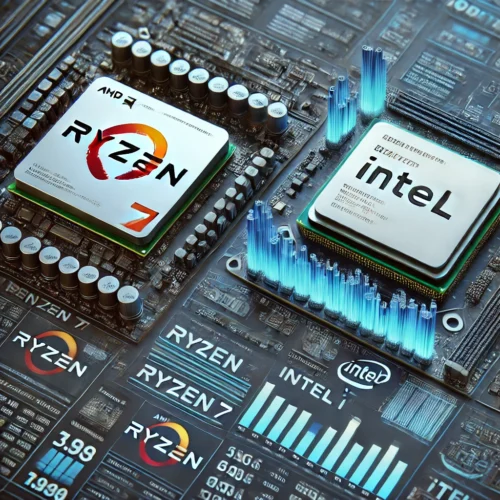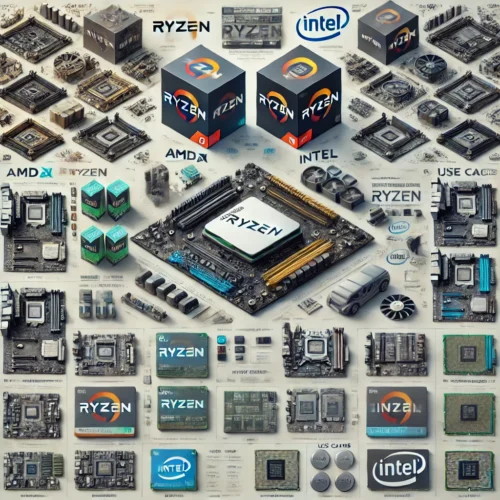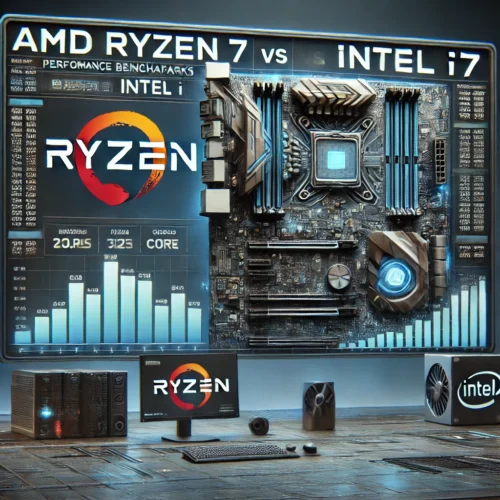AMD Ryzen 7 vs Intel i7
In the ever-evolving landscape of computer processors, two titans consistently battle for supremacy: AMD Ryzen 7 vs Intel i7. Both of these CPU families offer exceptional performance and innovative features, making it a tough decision for tech enthusiasts and gamers alike. This blog post will delve into the specifics of each processor, comparing their performance, power efficiency, pricing, and suitability for various tasks.
The AMD Ryzen 7 series was first released in March 2017, marking a significant shift in the CPU market. It brought high core counts and improved performance at competitive prices, challenging Intel’s dominance. Intel’s i7 series has been a staple in the market since its introduction in 2008, with continuous improvements in performance, power efficiency, and integrated graphics. The rivalry between these two series has spurred innovation, leading to advancements in both CPU and GPU technologies. AMD’s Ryzen 7, with its multiple cores and threads, has particularly pushed the development of multi-threaded applications and improved gaming performance, while Intel’s i7 has consistently provided high single-threaded performance, crucial for many games and applications.

Introduction to AMD Ryzen 7 and Intel i7
The AMD Ryzen 7 series, part of the Ryzen family, is known for its robust performance, multi-threading capabilities, and competitive pricing. On the other hand, Intel’s i7 processors, a staple in the Core series, are celebrated for their high single-core performance and power efficiency. Both processors are engineered to deliver top-tier performance, but they cater to slightly different needs and preferences.
The impact of these processors on the GPU industry has been profound. By offering powerful CPUs at various price points, they have enabled broader access to high-performance computing, driving demand for more advanced GPUs. The synergy between high-performance CPUs and GPUs has led to better gaming experiences, more efficient content creation, and enhanced AI and machine learning capabilities. Looking ahead, the continued competition and advancements in AMD Ryzen 7 and Intel i7 processors are expected to further boost GPU development, leading to even more powerful and efficient graphics solutions, fostering innovation across multiple industries.
Here’s a detailed specification table for both the Intel i7 and AMD Ryzen 7 processors:
| Feature | AMD Ryzen 7 | Intel i7 |
|---|---|---|
| Architecture | Zen, Zen+, Zen 2, Zen 3 | Coffee Lake, Ice Lake, Comet Lake, Rocket Lake |
| Process Technology | 7nm (Zen 3), 12nm (Zen+), 14nm (Zen) | 14nm (Comet Lake), 10nm (Ice Lake) |
| Cores/Threads | 8/16 | 6-8/12-16 |
| Base Clock Speed | 3.0 – 3.8 GHz | 2.5 – 3.8 GHz |
| Max Boost Clock | 4.3 – 4.9 GHz | 4.6 – 5.1 GHz |
| Cache (L3) | 16-32 MB | 12-16 MB |
| TDP | 65W – 105W | 65W – 125W |
| Integrated Graphics | None | Intel UHD Graphics 630/750 |
| Socket | AM4 | LGA 1151/1200 |
| Memory Support | DDR4-3200 | DDR4-2666 to DDR4-2933 |
| PCIe Support | PCIe 4.0 | PCIe 3.0/4.0 |
| Overclocking | Yes (Unlocked models) | Yes (Unlocked models, K series) |
| Price Range | $300 – $500 | $300 – $500 |
| Multi-threading Performance | Excellent (More cores/threads) | Good |
| Single-core Performance | Good | Excellent |
| Suitable For | Content creation, multi-threaded tasks | Gaming, single-threaded tasks |
Performance Comparison
When it comes to raw performance, both the Ryzen 7 and Intel i7 excel in different areas:
- Multi-Threading: AMD Ryzen 7 processors typically have more cores and threads, which translates to better multi-threading performance. This makes them ideal for tasks like video editing, 3D rendering, and multitasking.
- Single-Core Performance: Intel i7 processors often lead in single-core performance, making them a great choice for gaming and applications that rely heavily on single-threaded tasks.
Power Efficiency
Power efficiency is a critical factor, especially for users who want to build energy-efficient systems or are concerned about cooling and power consumption:
- Ryzen 7: Known for its balance between performance and power consumption, the Ryzen 7 series utilizes AMD’s Zen architecture, which offers significant improvements in power efficiency.
- Intel i7: Intel’s i7 processors, particularly the newer generations, boast impressive power efficiency thanks to their advanced 10nm and 14nm process technologies.
Pricing and Value
Budget considerations often play a significant role in choosing a processor:
- AMD Ryzen 7: Typically, Ryzen 7 CPUs offer a better price-to-performance ratio, providing high performance at a more affordable price point.
- Intel i7: While generally priced higher, Intel i7 processors can justify the cost with their superior single-core performance and integrated graphics options.
Games Playable with AMD Ryzen 7 and Intel i7
For gamers, the choice between Ryzen 7 and Intel i7 can impact gaming experience and frame rates:
- Ryzen 7: With more cores and threads, Ryzen 7 can handle modern games and streaming simultaneously, making it a good option for content creators and gamers.
- Intel i7: The Intel i7 shines in gaming due to its higher clock speeds and single-core performance, often resulting in higher frame rates in many games.
High Settings (1080p)
- Cyberpunk 2077
- Ryzen 7: High settings, 60-70 FPS
- Intel i7: High settings, 60-70 FPS
- Assassin’s Creed Valhalla
- Ryzen 7: High settings, 70-80 FPS
- Intel i7: High settings, 70-80 FPS
- Red Dead Redemption 2
- Ryzen 7: High settings, 60-70 FPS
- Intel i7: High settings, 60-70 FPS
- Shadow of the Tomb Raider
- Ryzen 7: High settings, 70-80 FPS
- Intel i7: High settings, 70-80 FPS
Ultra Settings (1080p)
- The Witcher 3: Wild Hunt
- Ryzen 7: Ultra settings, 60-70 FPS
- Intel i7: Ultra settings, 60-70 FPS
- GTA V
- Ryzen 7: Ultra settings, 70-80 FPS
- Intel i7: Ultra settings, 70-80 FPS
- Far Cry 5
- Ryzen 7: Ultra settings, 70-80 FPS
- Intel i7: Ultra settings, 70-80 FPS
- Battlefield V
- Ryzen 7: Ultra settings, 60-70 FPS
- Intel i7: Ultra settings, 60-70 FPS
Medium Settings (1440p)
- Call of Duty: Warzone
- Ryzen 7: Medium settings, 80-90 FPS
- Intel i7: Medium settings, 80-90 FPS
- Apex Legends
- Ryzen 7: Medium settings, 100-110 FPS
- Intel i7: Medium settings, 100-110 FPS
- Fortnite
- Ryzen 7: Medium settings, 120-130 FPS
- Intel i7: Medium settings, 120-130 FPS
- PUBG
- Ryzen 7: Medium settings, 90-100 FPS
- Intel i7: Medium settings, 90-100 FPS
Low Settings (4K)
- Overwatch
- Ryzen 7: Low settings, 70-80 FPS
- Intel i7: Low settings, 70-80 FPS
- CS
- Ryzen 7: Low settings, 150-160 FPS
- Intel i7: Low settings, 150-160 FPS
- Rocket League
- Ryzen 7: Low settings, 100-110 FPS
- Intel i7: Low settings, 100-110 FPS
- League of Legends
- Ryzen 7: Low settings, 120-130 FPS
- Intel i7: Low settings, 120-130 FPS

Suitability for Different Tasks
Different users have different needs, and the choice between Ryzen 7 and Intel i7 can depend on the primary use case:
- Content Creation: If your focus is on content creation, such as video editing or 3D modeling, the AMD Ryzen 7’s multi-threading capabilities make it an excellent choice.
- Everyday Computing and Gaming: For everyday tasks and gaming, the Intel i7’s single-core performance and efficiency provide a smooth and responsive experience.
Future-Proofing and Upgradability
Considering the longevity and upgradability of your processor is essential:
- Ryzen 7: AMD’s commitment to the AM4 socket means that Ryzen 7 processors are compatible with a wide range of motherboards, offering future-proofing and easy upgrades.
- Intel i7: Intel tends to introduce new sockets with new generations, which can limit upgradability but ensures cutting-edge performance with each release.
Conclusion
The battle between AMD Ryzen 7 vs Intel i7 is a clash of titans, each with its strengths and ideal use cases. If you’re looking for multi-threading performance and better value, the AMD Ryzen 7 is a compelling choice. However, if single-core performance and gaming are your priorities, the Intel i7 stands out. Ultimately, the best processor for you depends on your specific needs, budget, and preferences.
If you’re interested in optimizing your setup further, check out our detailed guide on Which GPU Should I Pair With Ryzen 5 2600. This resource will help you find the perfect GPU to complement your CPU, enhancing your system’s overall performance.
If you want to learn more about the benchmarks of these GPUs then click here.
By understanding the nuances of each processor, you can make an informed decision and build a system that meets your demands, whether for gaming, content creation, or everyday computing.

